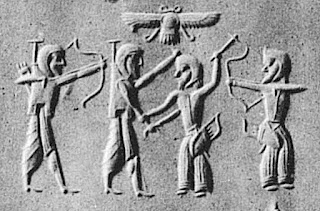It's been three months since the release of our new album. The album has received an excellent reception from fans and critics alike. In this blog post, we discuss the album track by track.
Sword Of The Millennia is the opening track. After being absent from our previous two full-lengths, the charcteristic old intro returns here. The song itself is a really crushing track, harking back to some of our older stuff, with some twists and turns nevertheless. The song is about the sword of the heretic, the protagonist of 1996's 'The Book Of The Heretic' and the protagonist of our classic song 'Child Of The Millennia' (who are one and the same).
Below The Sky starts off with a punky riff, but soon turns to a heavy verse and a really bombastic chorus. Lyrically, it is a monologue by a pagan describing how he views the world.
Wall Of The North tells the story of the battle of Tours in 732 CE, a painting of which by Charles de Steuben (1788-1856 CE) is depicted on the album cover. It's a traditional, pounding, heavy song with a quieter break that features a quote from the 'Chronicle of 754', the most detailed source on the battle.
 |
| A page from the 'Chronicle of 754' |
Ledovoye Poboishche is our first-ever song in Russian and that tells the story of Alexander Nevsky's victory over the crusader knights in 1242 CE. Title means 'Battle On The Ice' as this battle was fought on a frozen lake (Lake Peipus). The song was inspired by Sergei Eistenstein's legendary 1938 film 'Alexander Nevsky'.
Night Of The Fallen is probably the most old-fashioned black metal song on the record, inspired by the 1968 novel 'Black Easter' by James Blish (1921-1975 CE). The novel assumes black magic as describes in the grimoires actually works. It's about a wealthy arms dealer who hires a black magician to summons demons and let them loose of the earth for a limited amount of time, to enjoy the havoc they will create. This all goes predictably wrong and leads to armageddon.
Banners Of Blood is the title track, a slower and pounding song with a lot of atmosphere. The lyrics can be read as fantasy, but also tell a very real story.
Pagan Man is a new version of the song that was released as a single in August 2020. The song is largely the same, but the album version has a much better sound than the single version had. The lyrics speak for themselves.
Fall Of The Achaemenid Empire tells the story of the Persian empire that lasted from roughly 550 BCE to 330 BCE. Though the largest and most advanced state there had been up to that point, like all empires, it had to fall in the end.
 |
| Soldiers of the Achaemenid Empire |
Slachting Der Saksen (Slaughter Of The Saxons) tells the story of the Verden massacre in 782 CE, where Charlemagne had 4,500 Saxons beheaded because they refused to be baptised. An old-fashioned, epic song with an acoustic break that features a Latin quote from Charlemagne's law prescribing the death penalty for refusing to be baptised. A very interesting paper on this subject can be found here.
Last Man Of Honour was released as a single a few weeks before the album. This song was inspired by the life and times of Saigo Takamori (1828-1877 CE), the leader of the Satsuma rebellion who is commonly considered to have been the last true samurai.
Toortsen Uit Het Verleden (Torches From The Past) is one of two songs in Dutch on this album. This is actually an older song that was written back in 2004. The arrangement was only slighty changed for this album. It is one of two songs on the album to feature acoustic guitars, for the first time on a Countess album since 2007's 'Blazing Flames Of War'.
Sword Symphony is the last and longest song on the record and tells the story of Sigmund and his sword. It largely follows the tale as it is told in Völsunga saga. Musically this is probably the most adventurous song on the album.

Good work 👏 I always trying to find out more about your songs. Cheers! 🍻
ReplyDeleteThanks! \m/
Delete